I have been on the road for over a month now, and have honestly been happy to take a break from the ECOBANK, even though the team sends me information and I communicate back with them at least every week (aka 'working'), still - being able to rest a bit after the presale and all its implications and complications has been very nice. Remember you can always see the essential posts being reblogged on @ecobanker - and @ecobanker has had a number of 'stable coin adventures' in the meantime.
Now the market is open, and as I stated here, markets work a certain way (order books) and the market does what the market will do. 'Markets gonna market' is another way to say this, and while its true, its not true in a sense that anyone who knows nothing about it will get any new information out of it.
How should we now operate in these types of decentralized markets?
So order books are a known type of market, at least I think so - but let's spend a second reviewing the basics.
There are two 'books', the buy book and the sell book. They look like this:
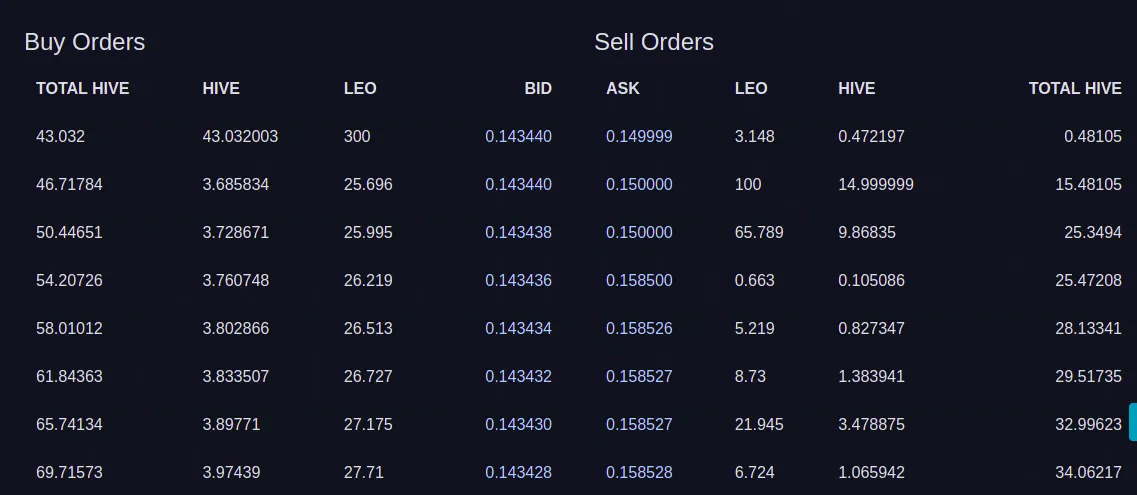
Almost every exchange works like this, FOREX works like this and stock trading works like this - but if you are new to this stuff, or old enough to want a reminder, let me do a basic run through.
Above is a picture of the 'tops' of both books, they go much 'deeper'. In the buy book, people offer to buy at a certain price, in the case of the image above, LEO token. As the price gets lower, there are more buys. This makes some sense from supply and demand perspectives. So the 'top' of the buy book is the highest price someone (anyone) is willing to pay for it, at this exact moment, that hasn't been 'filled' yet.
We say and order is 'filled' when a buyer meets a seller at a certain price.
There is a difference between 'maker' and 'taker', I can recommend the eminant @josephsavage's really good post about the topic. But simply, a maker, opens an order that doesn't immediately get filled. A taker, accepts a price that is already made, and opens an order that gets immediately filled. Makers add depth (liquidity) to order books, takers subtract depth (liquidity) from order books.
@josephsavage generally is a good source of information about this type of stuff, if only we could get him to post more 😜 Here is what he says about order book depth in different post:

So far we understand more or less that order books are where 'makers' go to list offers to buy or sell, which they do in a specific currency, for example dollars, or for hive-engine markets, swap.hive. 'Takers' can use order books to get instant liquidity, and can 'dump' their tokens to the buy book, or 'pump' their currency into the ask book when buying (often a result of 'fomo', fear of missing out, since you can usually get the same tokens at a lower price by listing an buy order)
In the above quote, @josephsavage mentions 'Market Makers', and most mature markets have these - these are people (likely robots, but its important that you know that robots are just a proxy for people), but to understand market makers we need to know what is 'spread'.
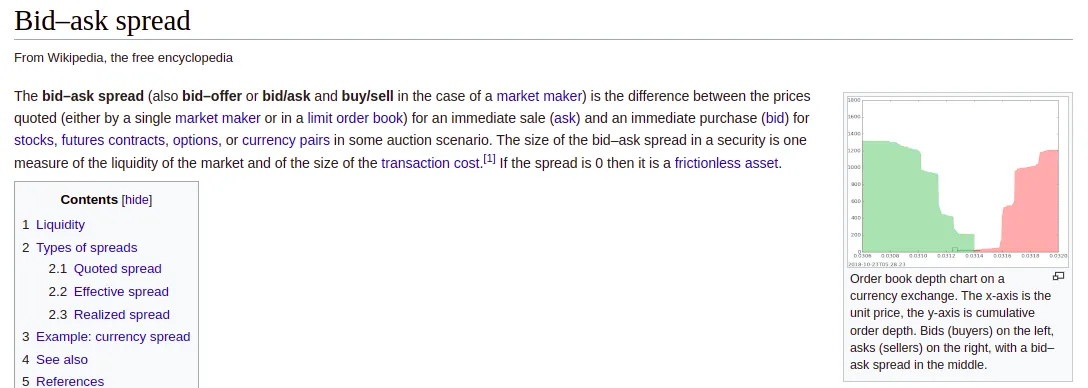
Wikipedia gives an alright explanation, its the difference in price for an 'immediate buy' (a.k.a. dump) vs an immediate sell at any given moment. Its comparing the takers' price for buying and selling.
Within any market, liquidity is key. We will touch more on this later, but liquidity is a special type of service, and depending on what holders do with their liquidity, different things can happen, different ways to 'earn' appear. Capital (liquidity) wants to make yield. Every thing about markets is in money terms.
Going back to Market Makers, any market with sufficient volume will attract a certain type of automation, and this is 'spread bots'. People assign their liquidity to automation (robots or 'bots') that work the spread, buying slightly lower than selling. There are many variables to consider; the wider the spread the bigger the ROI for a spread trade, the lower the volume generally the lower amount of liquidity that can be applied profitably to the activity.
Let's try to apply all this to a real life example -
What happened to ECOBANK token?
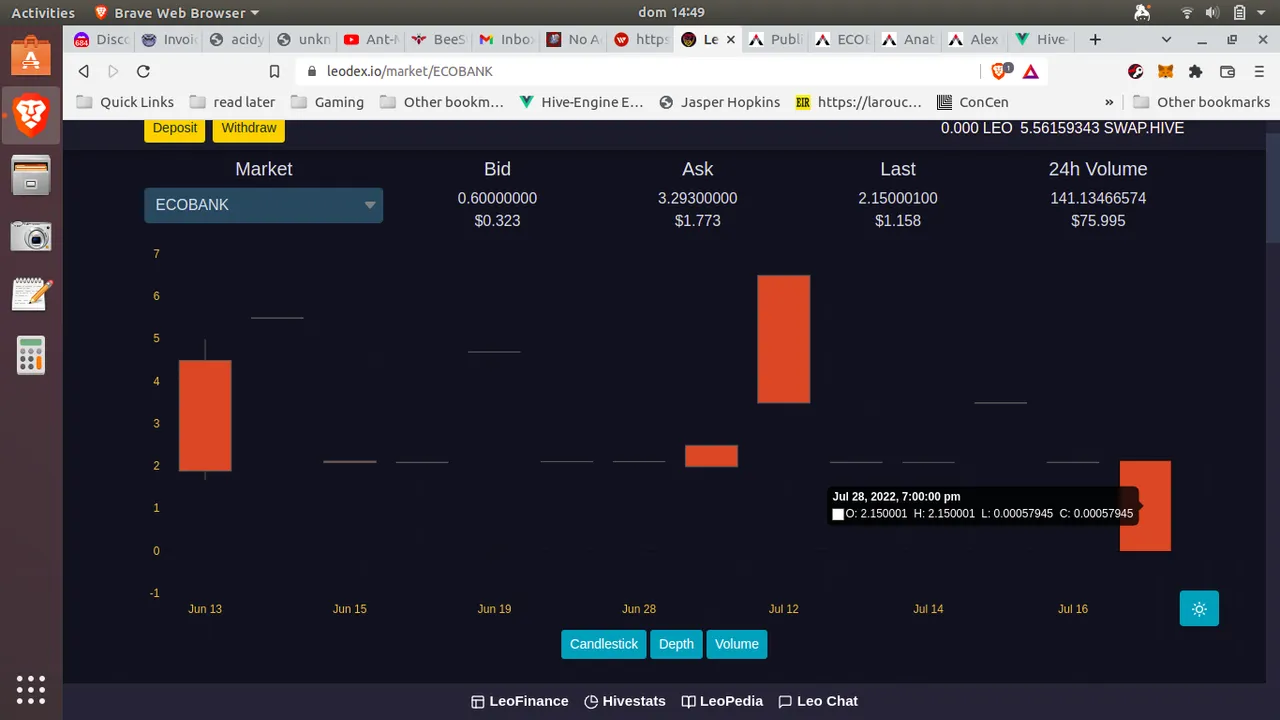
Did you notice that your token crashed?
So, this is something I knew could happen, I had some liquidity out there just in case, but I think two days before this happened, I removed my own liquidity here. I had some bills to pay and liquidity sitting here hadn't paid any yield yet - so I moved it.
And then, just like that - someone needed liquidity.
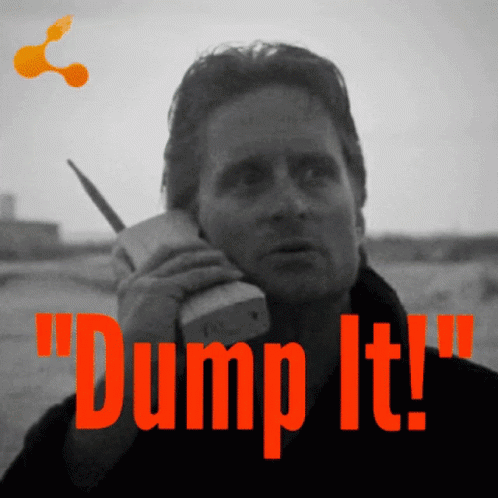
I don't know if @weirdestwolf needed money, or was just upset by my lack of updates, or made what they call a 'fat-finger mistake', but three days ago - he decided to dump 139 ECOBANK tokens.
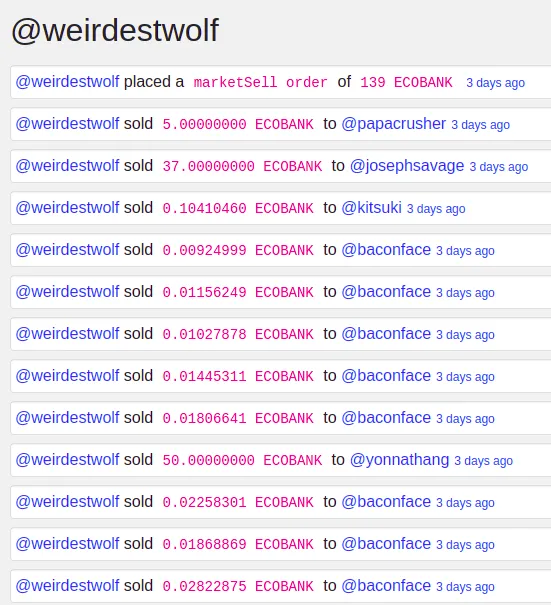
@papacrusher, @josephsavage, @kitsuki and @yonnathang had made lower bids and made out with some cheap tokens - way to go guys! They provided liquidity for the ECOBANK token market - with no guarantee of success, for a chance to scoop up some cheap tokens. And it worked!
And the rest of the tokens, over 46 of them, he sold to @baconface.

I like @baconface - I mean, what a great name. A lot of people think baconface represents something wrong with the system. @baconface has a bot to act on his behalf, and what he does is chose markets to apply liquidity too. And the way @baconface applies his liquidity is a giant asymmetric bet. He puts up offers for tokens that in a perfect world would never get filled. He is basically counting on the fact that when people dump tokens, they often have no idea how liquidity works, and they will sell them to him for basically nothing. Let's take a look.
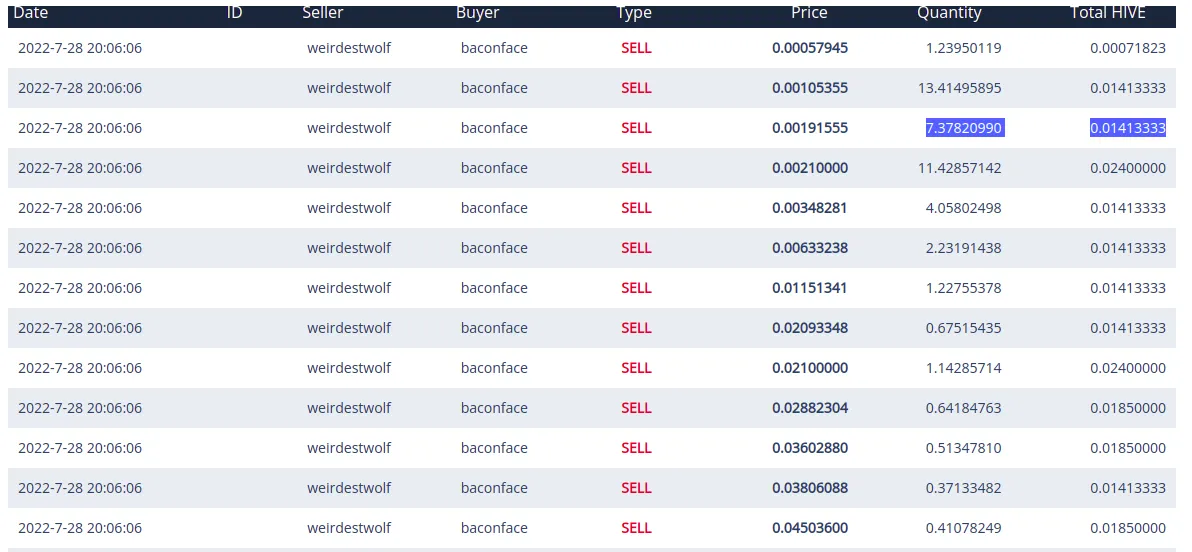
These are the details of the final transactions of selling weirdestwolf's ECOBANK tokens. The prices at some point stop making sense. If you look at the highlighted section, in this transaction @baconface buys 7.37 ECOBANK tokens for 0.014 HIVE. At current USD prices that is half a penny USD, or 0.005 USDT. And in the very next transaction, @baconface pays the same amount for 13.4 ECOBANK tokens.
I suspect this was a mistake on the part of @weirdestwolf, but it might be rational under a few situations. If he doesn't believe in the project anymore and he is confident the price will take a trip straight to zero, it might be rational. If the account was compromised and someone wanted to get funds out at fast as possible, it might be rational.
If you are a normal seller, what is rational is putting in a sell order.
Use sell orders to sell (even dump to a certain price)
Being a taker is all well and good in the high liquidity world. But on the edge of the digital universe where we live, you need to get a lot more comfortable with Sell Orders. Your sell order can be lower than the highest buy order (the bid), in which case if you are trying to move enough volume relative to the listed liquidity you will lower the price - but only lower it until the minimum price you are willing to get for the token! We can call this #dump2price.
Do tokens have any value?
Some of this might be based on the idea that tokens have no intrinsic value. And I suppose that if you think that a token has no intrinsic value - you should dump it! Get anything you can for it. When UST broke down, you see how fast LUNA went down with it - once a token is worthless, it tends to reflect it in its price really quickly.
Always try to detect a worthless token before buying it.
Asset backed funds are different than community backed tribe tokens. How you value them is different. But if a token supposedly has assets backing it, you can calculate an ABV - Asset backed-value per share (per token). Then the price it is trading at on a market can be referenced as at premium or at a discount relative to the ABV.
When @weirdestwolf sold ECOBANK to @baconface, he was selling at a discount to the ABV of the project.
Anyone can add liquidity at any time - its a truly open market (you only need HIVE KEYCHAIN wallet and an account). But it comes with a cost - an opportunity cost. Orders that don't get filled earn no yield. They just sit around, and in one month the orders expire. Where as you can earn 12% curation+inflation powering up your HIVE into HIVE POWER, your swap.HIVE orders that go unfilled earn NOTHING.
Project backed liquidity:
The project is more capable than most at potentially offering some liquidity to the market, in fact it was conceived in that way. But recently I have heard a lot more people commenting to me about how it might considered 'market manipulation' for a project to operate in its own market.
For now, all our stablecoin liquidity, and any stable yields we earn, are going to paying for the hotel we bought into. (The new suite is practically complete they tell me!).
The rest... which was earned either by me putting beneficiary to the account or by non stable yields from the stable coin management - is mostly in HP. The account has almost 2,000 HP now, worth over $1000 USD, basically free money that came into the project as a result of posting on HIVE and using HIVE as the backbone of communications behind the project.
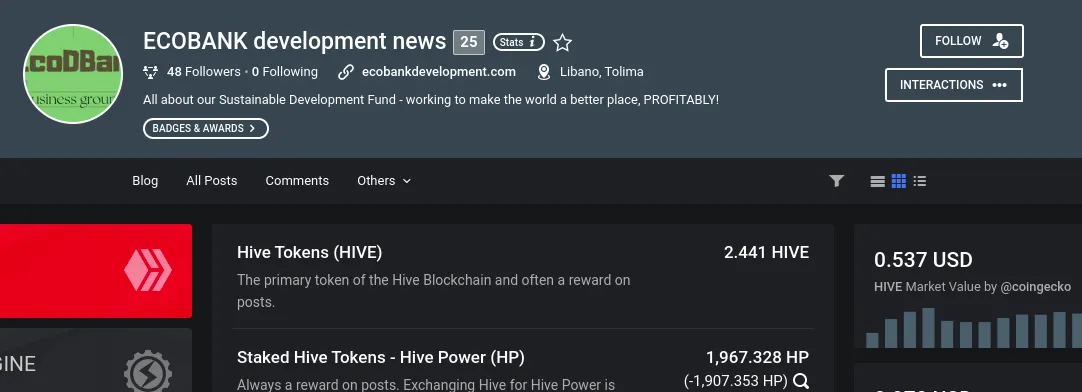
The other thing I am accumulating on the account is INCOME tokens, we now have 70. Read the post linked there if you are curious, but basically its a HIVE Power dominant digital asset-backed fund, we are buying at at a nice discount to ABV and I run it so I can be 100% sure that we won't get rugged.
All that good stuff to say - we are not providing liquidity for ECOBANK token
Any one can, I might put some up personally at different times. But if you are an ECOBANK holder, and you suddenly want to sell, consider making a SELL order at a reasonable price. The more reasonable you are, the faster its likely to sell.
If you are someone who wants to buy ECOBANK token, consider listing some buy orders at a price that would be tempting for you.
This is how markets are made.
Swap.HIVE conversion considerations
One thing to consider, is that the market is not related to USD. As HIVE price goes up, if the ECOBANK assets stay the same, the ABV in HIVE will go down in price. In these types of markets, spreads are usually a bit higher, since there is some consideration of how expensive the base token (in this case swap.HIVE) is in relation to the assets (in USD, or actually COP).
Patience is required to operate in these markets. Rush costs money, and patience is profitable. And this is related to risk. The risk being that patience losing everything and rushing to escape with something.
I am confident that HIVE isn't going to zero any time soon, and ECOBANK isn't either - we have two properties behind the project, and a very limited number of tokens. I get back to Colombia the first week of August, and we are likely to have lots of content to read about it throughout that month. We are talking to a few members and member adjacent people, we will see soon who will be the first member to visit the project!
TL;DR - HODL!
We are doing fine, the token didn't crash but one of our members did. Markets are somewhat complicated but you can learn too!